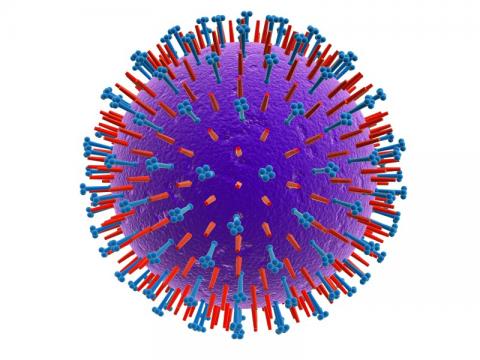Swine flu activity continues to decrease further

The Public Health Agency (PHA), Health and Social Care Board (HSCB) and the Department of Health, Social Services and Public Safety (DHSSPS), today hosted the final flu briefing of this winter flu season, to outline the current position on flu and seasonal winter pressures.
The PHA flu bulletin for the period 22 - 28 January 2011 shows that new flu cases and GP consultation rates continue to decrease. There were only 9 new laboratory confirmed cases of swine flu in Northern Ireland last week compared to 41 in the second week of January 2011.
Dr Maureen McCartney, Consultant in Health Protection, PHA, said: “Numbers of swine flu cases have decreased again this week, which is a further indication that we are likely to have passed the peak of this winter flu season. There were only 9 new cases of swine flu detections, meaning that swine flu is now only circulating at low levels.
As of noon on Wednesday 2 February 2011, 25 people have died from H1N1 flu during the current flu season. Of these, 22 had underlying medical conditions that predispose them to developing serious complications of flu, 2 did not and details for the remaining death have not been confirmed.”
Dr McCartney continued: “I would like to offer my sincere condolences to those who have been bereaved.
Vaccination still remains the most effective way to protect those who are most at risk from flu and its complications. While many people in the at risk groups have already taken up their offer of vaccine, some still have not. But it is not too late to get protected and you should see your GP about being vaccinated as soon as possible. Supplies of safe and effective vaccine against swine flu are available for at risk groups.”
Information provided by the Health and Social Care Board sets out the position with regard to the impact of flu and seasonal winter pressures on Northern Ireland’s hospitals.
The position, as of Wednesday, 2nd February, 2011, is that nine out of 69 adult critical care patients and no paediatric critical care patients are being treated for flu like illness. This is a further improvement on the position last week, and as a result hospitals continue to operate the normal local arrangements for managing critical care capacity. It has therefore not been necessary to cancel any elective activity due to swine flu in the past week.
Of all patients being treated in hospital in Northern Ireland today, approximately 0.50 per cent are being treated as confirmed or suspected swine flu. This is a further reduction on the position last week.
The Board is continuing to work closely with Trusts and primary care colleagues to ensure that services are maintained for the community. Accident and Emergency departments, while busy, continue to be fully operational, and although primary care services continue to report they are busy, they are continuing to cope well.
DHSSPS Senior Medical Officer Dr Liz Reaney said:
"I am pleased to note the further downward trend in the number of new confirmed flu cases this week. The number of GP consultations has also continued to fall for the third week in a row. This gives us increasing confidence that the peak of swine flu has passed this year. This remains very much in keeping with the picture across the rest of the UK.
"Unfortunately however, two more deaths have been reported. My thoughts are with the bereaved families who we must remember are going through a very difficult time.
"I want to acknowledge the ongoing commitment and dedication of staff throughout our health service, who have faced a variety of challenging situations this winter."
For further information and advice on flu visit the fluaware pages at: www.publichealth.hscni.net
ENDS
For information on issues contained in the flu bulletin contact the PHA Press Office on 028 9031 1611.
For matters on Health and Social Care services and winter pressures contact the HSCB on 028 9032 1313
For policy issues contact the DHSSPS press office on: 028 9052 0074.
1. A copy of the PHA flu bulletin is available on the fluaware pages and on the main PHA website www.publichealth.hscni.net
2. Deaths reported in the PHA flu bulletin do not include that of a child resident in the Republic of Ireland.
3. Vaccination uptake figures period ending December 2010, the proportion of people in Northern Ireland aged 65 years and over who had received the 2010/11 seasonal influenza vaccine was 69.8%, while the uptake in those aged under 65 in an at risk group was 62.7%. This compares with 77% uptake in the over 65 years, and 81.8% in the under 65 at risk group, for the same period last year during the pandemic
4. Who should get the flu vaccine?
• Anyone aged 65 or over.
• Children and adults who have any of the following medical conditions:
- a chronic chest condition such as asthma;
- a chronic heart condition;
- chronic liver disease;
- chronic kidney disease;
- diabetes;
- lowered immunity due to disease or treatment such as steroids or cancer therapy;
- a chronic neurological condition such as stroke, multiple sclerosis or a condition that affects your nervous system, such as cerebral palsy.
• Pregnant women regardless of their stage of pregnancy.
• Anyone living in a residential or nursing home.
• If you are the main carer for an elderly or disabled person.
• Children who have previously been admitted to hospital with a chest infection.
